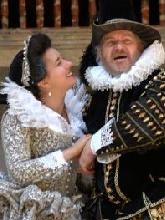SEARCH
REVIEWS
FEATURES
NEWS
Etcetera and
Short Term Listings
LISTINGS
Broadway
Off-Broadway
BOOKS and CDs
OTHER PLACES
Berkshires
London
LA/San Diego
Philadelphia
Elsewhere
QUOTES
On TKTS
LETTERS TO EDITOR
FILM
LINKS
MISCELLANEOUS
Free Updates
Masthead
Writing for us
A CurtainUp  London Review
London Review
 London Review
London ReviewThe Winter's Tale
|
My wife is slippery.
---- Leontes |

Yolanda Vasquez as Hermione and Paul Jesson as Leontes
(Photo: Andy Bradshaw) |
The production is an original one. Everything, except the mixed cast, is as would have been available to the theatre of 1599. This includes fabrics, props and musical instruments. For those looking for authenticity, these original practices are as close as it is possible to get without dressing up the groundlings in Elizabethan costume and giving them sack to swig and pyes to eat.
Sometimes I wonder whether the Globe productions might be more in place being reviewed in the Travel and Tourism pages rather than by theatre critics. Critics see so many plays that they tend to give marks for originality, new ways of seeing much-staged drama. They tend to forget that the average member of the audience will only see The Winter's Tale up to a few times in a life time and that maybe they would prefer not to see a version that is zany or outlandish. I remember taking some twelve year olds to see Romeo and Juliet with a small interchangeable cast. One of the boys asked me whether Tybalt and Juliet were the same person because the actor playing Juliet would put on a coat and a rough voice to change gender and character. A similar reaction would be expected from this year's breakaway production of The Tempest at Shakespeare's Globe where Miranda doubles as Ariel. Under the new Artistic Director Dominic Dromgoole, we can probably expect less conventional productions in 2006.
I was struck by the petulance of Leontes (Paul Jesson), the blindness of his jealousy of his ally Polixenes (Peter Forbes). There were words I remember hearing at the Globe which now I do not recall in other productions. That expression of Leontes, "I have drunk and seen the spider". Does that not conjure up the terrible experience of Leontes' worst and unfounded fears that he is married to an adulteress? Does it mean that some of Leontes' rage was alcohol induced? Probably not.
"There may be in the cup
A spider steeped, and one may drink, depart,
And yet partake no venom, for his knowledge
Is not infected; but if one present
Th' abhorred ingredient to his eye, make known
What he hath drunk, he cracks his gorge, his sides,
With violent hefts. I have drunk and seen the spider."
Looking at the whole verse it is clear that Leontes is saying that one's spouse can be adulterous but in ignorance, the adultery worries one not. The irony here is that the adulterous act is solely in Leontes' imagination. Hermione is described by Leontes, not in the courtly language expected of a king but in the language of the streets, as a "bed swerver" and "kissing with inside lip". Seeing Shakespeare at the Globe seems to underline those wonderful sixteenth century words like "strumpet," now little used. I have seen many angry Leontes, but Paul Jesson's performance struck me as more psychologically complex than mere anger. I was truly moved by Leontes' remorse sixteen years on.
In Yolanda Vasquez's Hermione we see the virtue extolled by the patient Griselda in Chaucer's The Clerk's Tale. She says of her past life, I am "as chaste as I am now unhappy." Her stately speech brims with reasonableness. In the statue scene she is given a marble plinth to stand on and a broken marble column to lean on and this works well. There is no doubt that sixteenth century women, even the daughter of the Emperor of Russia as Hermione is, had few rights compared to their husbands. The punishment when it comes for Leontes is not the loss of his wife or his daughter but of his male heir. In this production, this announcement of the prince's death is accompanied by a clap of thunder echoing the findings of the Oracle.
A grubby faced Autolycus (Colin Hurley) inspires some audience participation as he tries to get young girls in the audience to sing, but some of the comic highlights of his part seem not to be fully exploited. Perdita is excellent and Florizel (David Sturzaker) is a handsome young prince. Direction is limited by original practices but I liked the courtly women skating in wooden skates on the Globe's stage in their magnificent costumes. The court is dressed in black and white but the country scenes see the use of colour, a nice contrast between urban and pastoral.
|
THE WINTER'S TALE
Written by William Shakespeare Master of Play: John Dove With: Sam Alexander, Penelope Beaumont, Philip Bird, Peter Forbes, Colin Hurley, Paul Jesson, Roger McKern, Thomas Padden, Edward Peel, Juliet Rylance, Hayley Jayne Standing, David Sturzaker, Yolanda Vasquez, Roger Watkins, Liana Weafer Master of Clothing, Properties and Hangings: Jenny Tiramani Master of Historical Music: William Lyons Master of Dance: Siãn Williams Master of the Words: Giles Block Master of Movement: Glynn MacDonald Master of Voice: Stewart Pearce Running time: Two hours fifty minutes with an interval. Box Office: 020 7401 9919 Link to website: http://www.shakespeares-globe.org Booking to 1st October 2005 Reviewed by Lizzie Loveridge based on 15th June 2005 performance at Shakespeare's Globe, New Globe Walk London SE1 (Tube Station: London Bridge/Mansion House via Millennium Bridge) |





